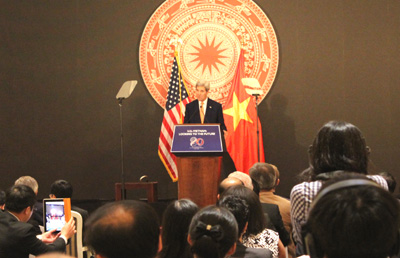The U.S. Embassy, in cooperation its Vietnamese government partners, on August 7 held a signature event entitled “Advancing Prosperity: Twenty Years of U.S.-Vietnam Development Cooperation,” to highlight key achievements since the normalization of the diplomatic relations between the two countries in 1995 and outline the agenda for future cooperation.
The event, organized by United States Agency for International Development (USAID), featured keynote addresses by U.S. Secretary of State John Kerry and Vietnam’s Deputy Prime Minister/Foreign Minister Pham Binh Minh, as well as participation by U.S. Ambassador Ted Osius, USAID/Vietnam Mission Director Joakim Parker, leaders of the Ministries of Planning and Investment, Foreign Affairs, development experts, university thought-leaders, development partners, and representatives of organizations, enterprises and media from both Vietnam and the U.S.
U.S. Secretary of State John Kerry remarked in his keynote speech: “For many years, I have looked forward to the time when Americans would hear the word “Vietnam” and think more of a country, not a conflict. I believe I can say – again without failing to honor past sacrifice and service – that we have reached that point now. So the time has come to look ahead, and to understand that the United States-Vietnam agenda is no longer shaped primarily by what was. We are not still in the process of reconciliation. The big news today is that the United States and Vietnam have reconciled.”

In 2013, President Obama and President Truong Tan Sang launched a comprehensive partnership between our governments, a partnership that also extends more broadly to our peoples. Today, we are strengthening our ties in a host of areas – education, the environment, science, technology, high-tech, the Internet, and even military-to-military cooperation. We also have a priceless opportunity to achieve a breakthrough on trade. Twenty years ago, there were fewer than 60,000 annual American visitors to Vietnam. Today, there are nearly half a million. Twenty years ago, there were fewer than 800 Vietnamese students studying in the U.S. Today, there are 17,000. Twenty years ago, bilateral trade between us in our goods was only US$451 million. Today, it’s more than US$36 billion. These aren’t just statistics. They are a measure of one of the most remarkable transformations in history.”
In the opening remarks, USAID/Vietnam Mission Director Joakim Parker briefly introduced achievements in the field of development cooperation over the past 20 years, focusing on successes in governance, trade, health and disability sectors through the efforts of both public and private actors. “The milestones are truly coming faster – consider the comprehensive partnership announced in 2013 and the General Secretary’s visit to Washington last month. The joint statements from each show development cooperation’s catalytic role and outline its vital contributions in many areas. The words of almost every new SDG are in those joint statements, as well as an understanding of how the TPP, supported with related investments, will be a game changer.” He appreciated valuable roles of big and small American NGOs and businesses which have been so critical to the successes to date.
One of the most publicly recognized contributions of USAID is the Provincial Competitiveness Index (PCI) which has demonstrated the value of transparency and incentives to improve. Over ten years, Vietnamese businesses have shared more than 88,000 submissions to the annual survey and more than 1 million articles have been written on what the PCI reveals about governance in Vietnam’s 63 provinces. “Through our partners, notably Vietnam Chamber of Commerce and Industry (VCCI), we have conducted 257 workshops for 42,000 provincial leaders and staff to help them improve governance,” he noted.
According to Joakim Parker, USAID Vietnam will continue the priorities in cooperation on governance, the rule of law, environment and climate change, health, science and technology, and education.
Looking forward to the future of the U.S-Vietnam comprehensive cooperation, John Kerry stressed: “It took us 20 years to normalize ties. It took us 20 more years to move from healing to building. Think of what we can accomplish in the 20 years to come. There are steep hills yet to climb, and hard choices to make for our partnership in order to reach its full potential. But we know that the sky above us is the limit; given what we have achieved, and our people’s common aspirations, anything – and everything – is possible. That is a testament to the grit and determination of both Americans and Vietnamese, and a powerful sign that – although ever mindful of the past – we are dedicated to a future of prosperity, peace, and freedom for all.”
Nam Pham
